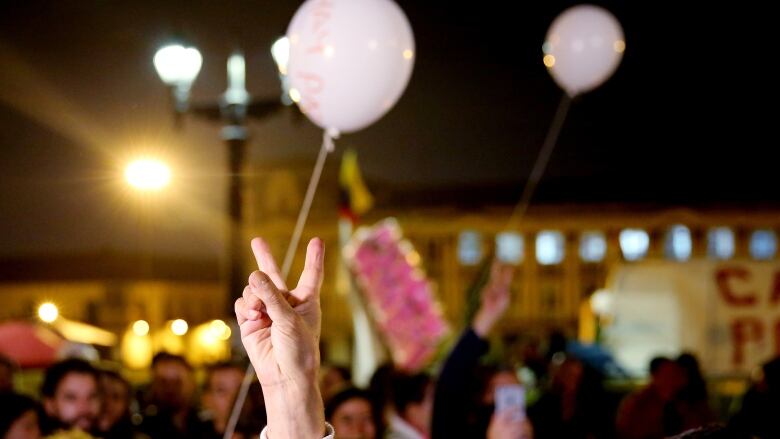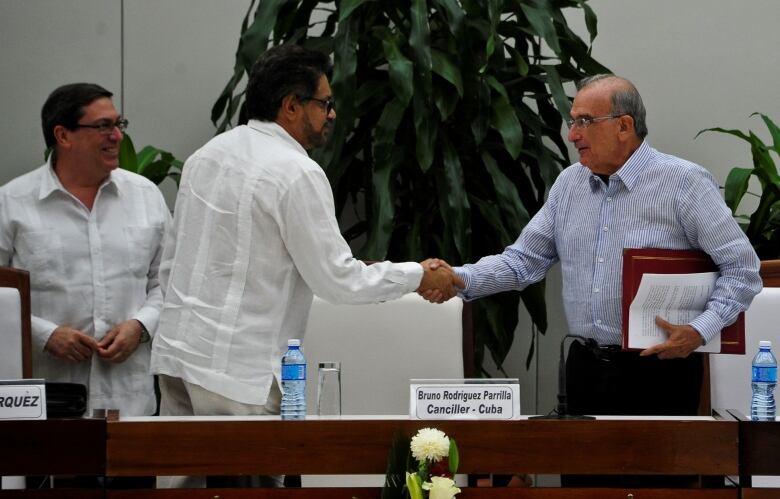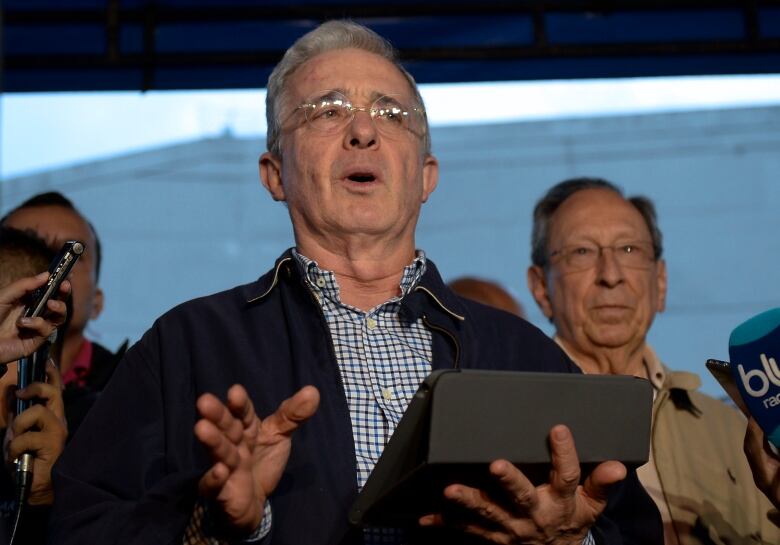Colombians get 2nd chance at peace with new, revised treaty
President expected to seek quick approval through congress, rather than risking another referendum

Unlike Americans stuck with president-elect Donald Trump or British voters second-guessing their exit from the European Union, Colombians who shocked the world by rejecting a treaty to end a 52-year-old guerrilla war will get a do-over.
On Saturday, the Colombian government and Marxist rebels signed a modified peace accord that puts tougher conditions on the guerrilla group known as FARC. It comes just six weeks after Colombians voted down an earlier version of the peace plan, prompting fears that the country could slide back into war.
"It's an unexpected second chance that should make the peace process more palatable to its critics," said Cynthia Arnson, director of the Latin America program at the Woodrow Wilson International Center for Scholars in Washington.
The new accord includes many provisions from the old. But it takes away several controversial benefits for the guerrillas that angered Colombians and sparked the surprise victory of the No vote in an Oct. 2 binding plebiscite.
Rather than risking another defeat at the ballot box, President Juan Manuel Santos is expected to seek quick approval of the modified peace accord through the Colombian congress. which is dominated by pro-government parties, Arnson said.

That would allow some 6,000 FARC guerrillas scattered around the country to start disarming and let the government start implementing other parts of the peace accord such as developing former conflict zones.
"I invite all Colombians those who were for and against the old accord to give this new peace agreement a chance," Santos said Saturday night in a national televised address.
'Country is still very divided'
In Bogota, Colombian protesters who had camped in front of the presidential palace for the past six weeks demanding an end to the war celebrated the news by singing and chanting. A spokesperson for UNSecretary-General Ban Ki-moon, who has strongly supported the peace talks, declared that Colombians "now have a new opportunity to go forward on this road to peace, more unified than before."
In fact, the country remains polarized over the peace process.
The FARC rebels committed massive human rights abuses and were deeply involved in drug trafficking, kidnapping, extortion and other crimes. As a result, many Colombians view FARC members more like criminals than guerrilla fighters and have no stomach for offering them concessions.

But President Santos has long argued that the only way to end such abuses is by disarming the FARC. His government has spent the past five years in both secret and public negotiations with FARC leaders in Havana to end a war conflict that has killed more than 220,000 people and has uprooted five million from their homes.
Santos was so confident that voters would approve the resulting peace treaty that he staged an elaborate signing ceremony, including thousands of invited guests, a week before the plebiscite. Its rejection was a devastating blow to both Santos and the FARC.
"It put at serious risk five years of work aimed at achieving national reconciliation," said Ivn Mrquez, the FARC's chief peace negotiator.
However, Santos received a boost five days later by winning this year's Nobel Peace Prize. He spent two weeks meeting with critics of his peace plan then sent his negotiators back to Havana for marathon sessions with Mrquez and other FARC leaders who agreed to more than 50 changes in the original 297-page accord.

For example, rebels convicted of massacres and other war crimes will be confined in rural areas and will face face tougher restrictions on their movements. A special tribunal set up to prosecute FARC leaders will no longer include foreigners among its magistrates and must finish its work within 10 years.
The guerrillas will also have to declare their assets derived from drug-trafficking, extortion, and illegal gold mining and use them to help compensate their victims.
Upon disarming, the FARC plans on forming a left-wing political party and the original accord would have guaranteed the organization 16 seats in Congress over an eight year period a provision that has now been erased.
But it's unclear whether critics of the peace plan chief among them hardline former President lvaro Uribe will be satisfied with the changes.

Uribe had insisted that FARC commanders accused of war crimes be excluded from running for political office. But Santos rejected this demand and pointed out that the basic idea of most peace processes is for guerrillas to disarm in exchange for participating in the legal political system.
Speaking to reporters on Saturday, Uribe called on Santos to allow critics and war victims groups to study the new proposals. But Santos is in a hurry to move the peace plan through Congress before lawmakers adjourn for the Christmas holiday and indicated in his speech that the current version is final.
"Overall, this is a better agreement for having gone through this (revision) process," said Arnson of the Woodrow Wilson Center. "But the country is still very divided."












_(720p).jpg)


 OFFICIAL HD MUSIC VIDEO.jpg)
.jpg)



























































































